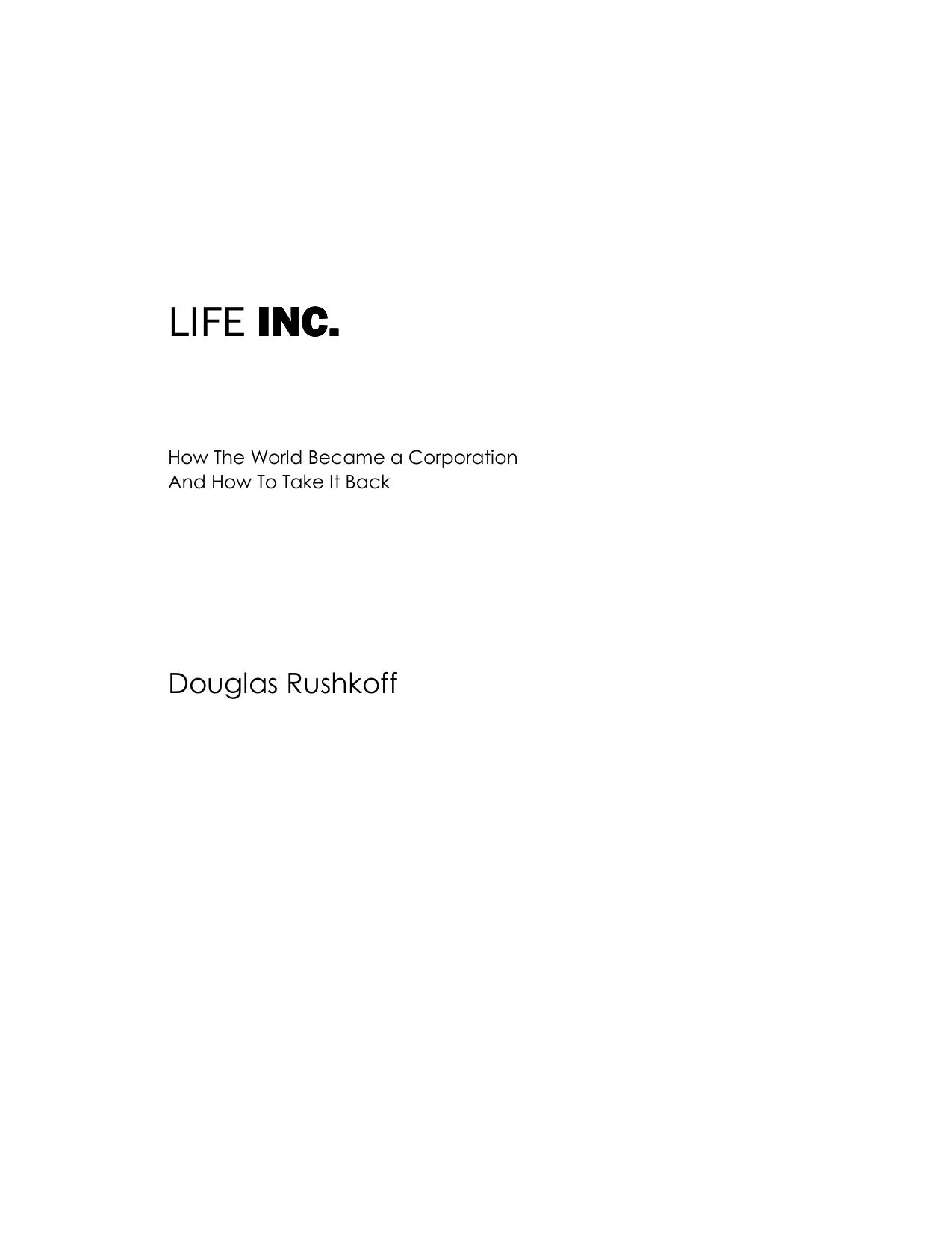Life Inc. by Douglas Rushkoff

Author:Douglas Rushkoff [Rushkoff, Douglas]
Language: eng
Format: epub, pdf
ISBN: 978-1-58836-849-2
Publisher: Random House Publishing Group
Published: 2009-03-25T16:00:00+00:00
Central Currency
The economy in which we all participate is no more natural than the game scenarios John Nash set up to test the Rand Corporation’s secretaries. It is a model for human interaction, based on a set of false assumptions about human behavior. Even if we buy the proposition that people act as self-interestedly as they possibly can, we must accept the reality that people’s actual choices don’t correspond with their own financial well-being. They do not act in their own best financial interests. People are either both greedy and stupid, or something else entirely.
The only ones behaving rationally under the given circumstances are corporations. And this isn’t because corporations have so effectively adapted to the economy; it’s because the economy was adapted to them.
We have to go back to the Renaissance just one more time to trace the origins of the stuff we currently call money. The currency system we still use today was invented with very specific biases in mind—ones that promoted the power of central authorities and the assets of the already wealthy, while reducing the ability of smaller groups and local regions to create value for themselves.
This is an almost untold story. History books gloss over or omit entirely the process through which monarchs outlawed certain currencies while promoting others. Contemporary economists, meanwhile, seem oblivious of the concept that other kinds of money with very different biases ever existed. The system they call “the economy” is not a set of natural laws, but a series of observations and strategies based on a very particular game with a carefully developed set of rules. It has simply been in place so long that our business and finance professionals have forgotten there were ever any alternatives. Over the course of my research, I interviewed fiscal strategists at Credit Suisse, Morgan Stanley, and Smith Barney about the biases of the money we use, and not one of them understood what I was talking about. “I’m not an economics historian,” one chief economist explained. “There’s other kinds of money?” the head of one currency desk asked.
Yes, there are. Or at least there were. The kind of money we use—centralized currency—is just one of them. Moneys are not neutral media any more than guns, televisions, or pillows are neutral technologies. They each favor certain kinds of behaviors and discourage others.
Our money—dollars, pounds, euros, yen, and all those other currencies we can get at the airport exchange or invest in at Forex.com—is lent into existence by a central bank. This bank is usually a private corporation chartered by the government to manage currency. The corporation—be it the Bank of England or the Federal Reserve—lends a certain amount of money to a smaller bank, which then lends it to a company or a person. It has to be paid back, at some rate of interest, to each lender by each borrower. At each step along the way, the lender takes his cut. So if the bank lends a company $1 million to start a
Download
This site does not store any files on its server. We only index and link to content provided by other sites. Please contact the content providers to delete copyright contents if any and email us, we'll remove relevant links or contents immediately.
| Ethics | Etiquette |
| Fashion & Image | Health & Stress |
| Motivation & Self-Improvement | Work Life Balance |
| Workplace Culture |
Tools of Titans by Timothy Ferriss(8369)
Change Your Questions, Change Your Life by Marilee Adams(7762)
Deep Work by Cal Newport(7068)
Playing to Win_ How Strategy Really Works by A.G. Lafley & Roger L. Martin(6255)
Man-made Catastrophes and Risk Information Concealment by Dmitry Chernov & Didier Sornette(6007)
Big Magic: Creative Living Beyond Fear by Elizabeth Gilbert(5757)
Digital Minimalism by Cal Newport;(5750)
Ego Is the Enemy by Ryan Holiday(5417)
The Slight Edge by Jeff Olson(5410)
The Motivation Myth by Jeff Haden(5206)
The Laws of Human Nature by Robert Greene(5182)
Stone's Rules by Roger Stone(5081)
Tuesdays with Morrie by Mitch Albom(4774)
Eat That Frog! by Brian Tracy(4526)
Rising Strong by Brene Brown(4451)
Skin in the Game by Nassim Nicholas Taleb(4240)
The Money Culture by Michael Lewis(4198)
Bullshit Jobs by David Graeber(4179)
Skin in the Game: Hidden Asymmetries in Daily Life by Nassim Nicholas Taleb(3993)
